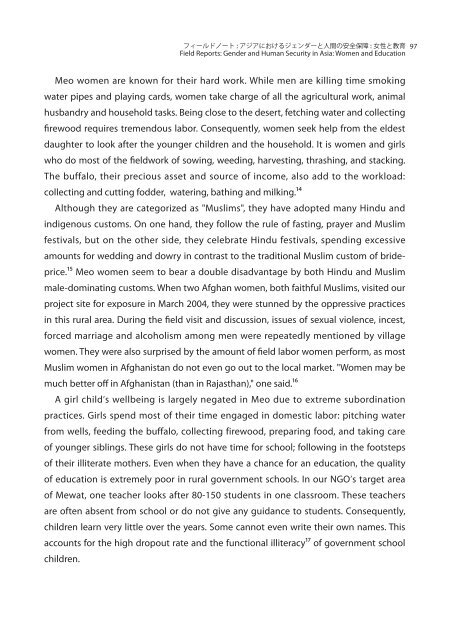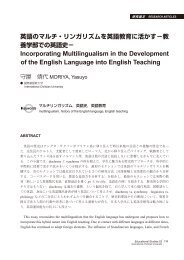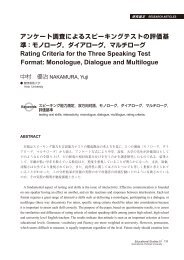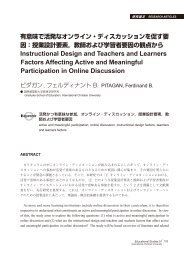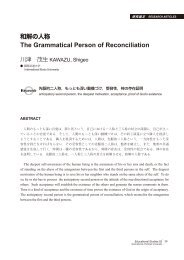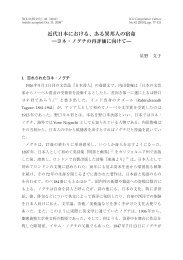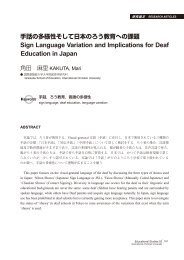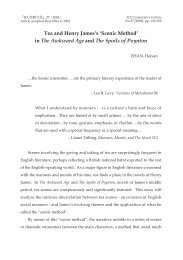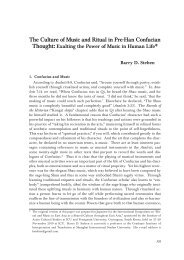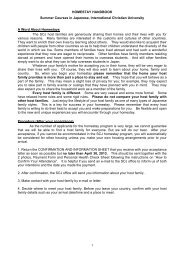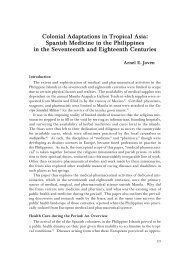Untitled - subsite - å½éåºç£æ大å¦
Untitled - subsite - å½éåºç£æ大å¦
Untitled - subsite - å½éåºç£æ大å¦
Create successful ePaper yourself
Turn your PDF publications into a flip-book with our unique Google optimized e-Paper software.
: : 97<br />
Field Reports: Gender and Human Security in Asia: Women and Education<br />
Meo women are known for their hard work. While men are killing time smoking<br />
water pipes and playing cards, women take charge of all the agricultural work, animal<br />
husbandry and household tasks. Being close to the desert, fetching water and collecting<br />
firewood requires tremendous labor. Consequently, women seek help from the eldest<br />
daughter to look after the younger children and the household. It is women and girls<br />
who do most of the fieldwork of sowing, weeding, harvesting, thrashing, and stacking.<br />
The buffalo, their precious asset and source of income, also add to the workload:<br />
collecting and cutting fodder, watering, bathing and milking.¹⁴<br />
Although they are categorized as "Muslims", they have adopted many Hindu and<br />
indigenous customs. On one hand, they follow the rule of fasting, prayer and Muslim<br />
festivals, but on the other side, they celebrate Hindu festivals, spending excessive<br />
amounts for wedding and dowry in contrast to the traditional Muslim custom of brideprice.¹⁵<br />
Meo women seem to bear a double disadvantage by both Hindu and Muslim<br />
male-dominating customs. When two Afghan women, both faithful Muslims, visited our<br />
project site for exposure in March 2004, they were stunned by the oppressive practices<br />
in this rural area. During the field visit and discussion, issues of sexual violence, incest,<br />
forced marriage and alcoholism among men were repeatedly mentioned by village<br />
women. They were also surprised by the amount of field labor women perform, as most<br />
Muslim women in Afghanistan do not even go out to the local market. "Women may be<br />
much better off in Afghanistan (than in Rajasthan)," one said.¹⁶<br />
A girl childs wellbeing is largely negated in Meo due to extreme subordination<br />
practices. Girls spend most of their time engaged in domestic labor: pitching water<br />
from wells, feeding the buffalo, collecting firewood, preparing food, and taking care<br />
of younger siblings. These girls do not have time for school; following in the footsteps<br />
of their illiterate mothers. Even when they have a chance for an education, the quality<br />
of education is extremely poor in rural government schools. In our NGOs target area<br />
of Mewat, one teacher looks after 80-150 students in one classroom. These teachers<br />
are often absent from school or do not give any guidance to students. Consequently,<br />
children learn very little over the years. Some cannot even write their own names. This<br />
accounts for the high dropout rate and the functional illiteracy¹⁷ of government school<br />
children.


